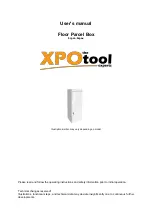
SAFEStor User Guide
Page 59
Maximum SATA Mode
The Maximum SATA Mode function allows you to set the maximum SATA mode that the
system can support as well as enabling Native Command Queuing (NCQ). Select the Max
SATA mode from the list and press Enter to select.
HDD Read Ahead Cache
Select the read ahead function to enable pre-fetching of data that has not specifically been
requested in anticipation of subsequent reads for this data. This function may improve
sequential read throughput.









































